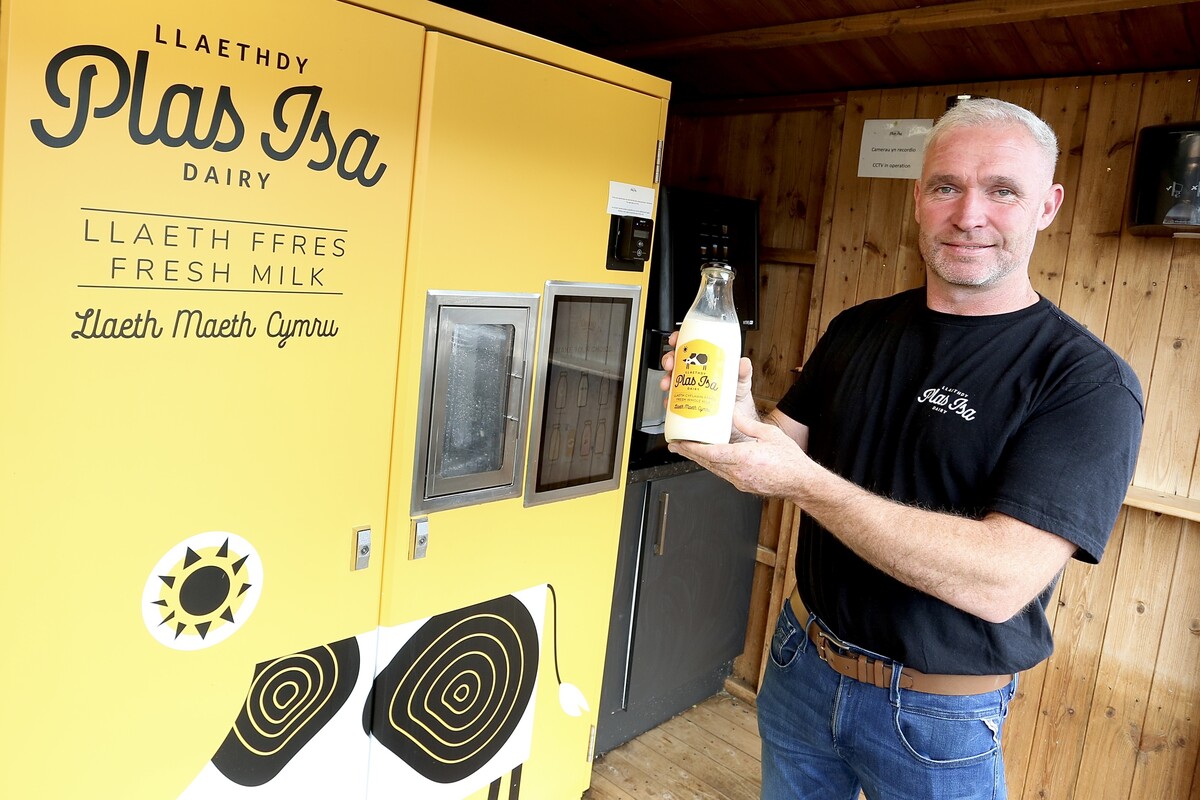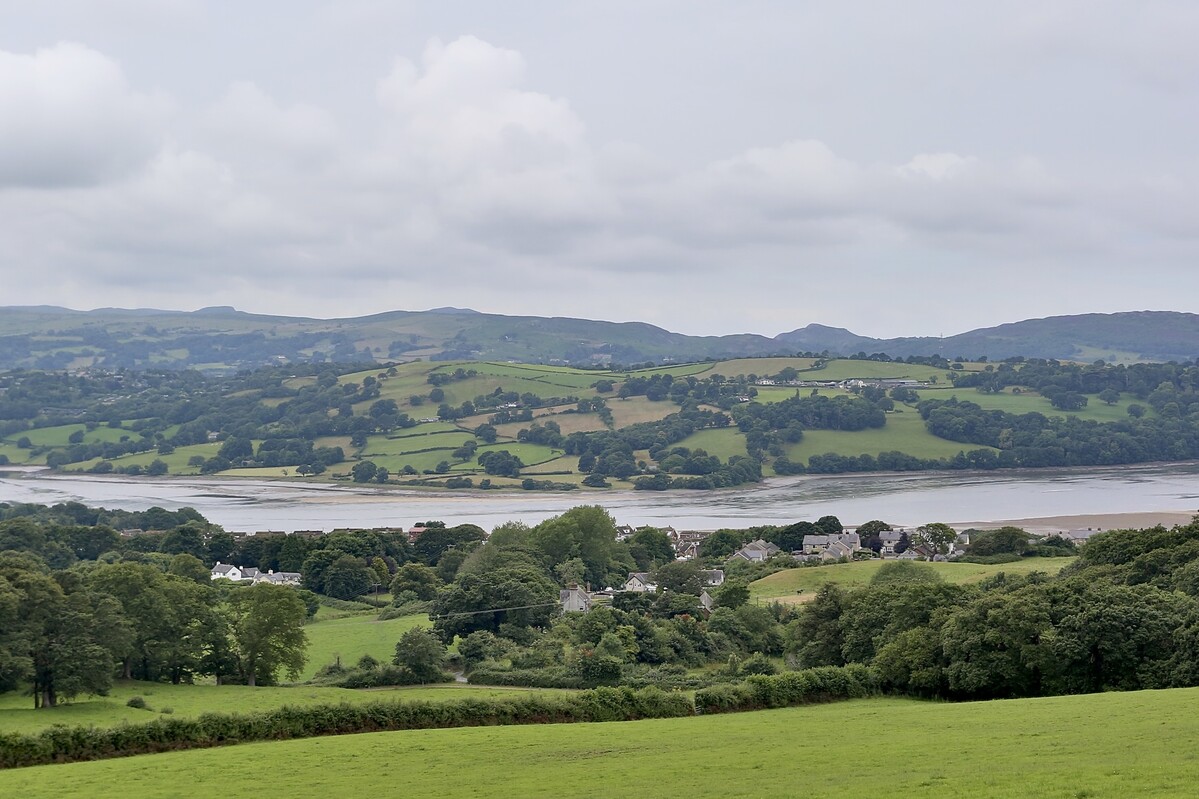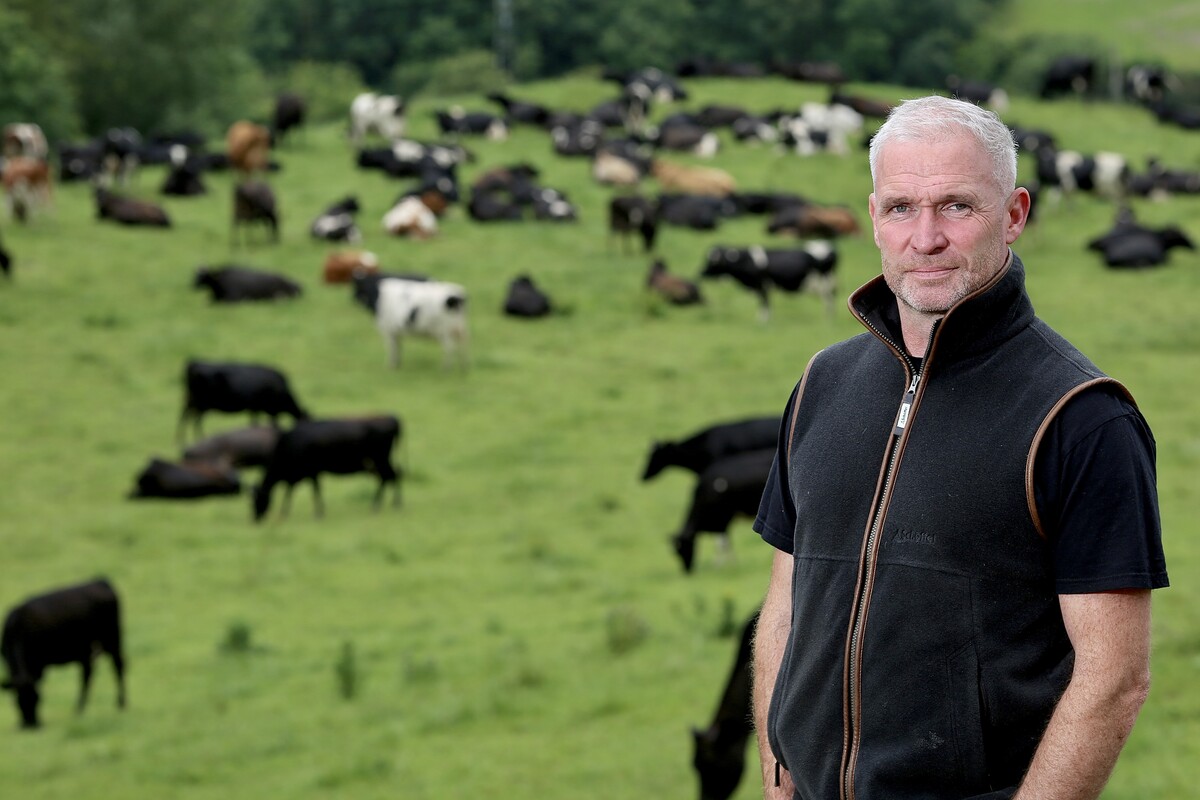There was a moment or two in 2015 when Huw Clwyd Jones questioned the wisdom of his decision to convert his beef and sheep farm to dairy, having never milked a cow.
With just months to go before the due calving dates of his 450 newly acquired heifers, milk prices started to tumble but, more worryingly for Huw and his wife, Rachael, was the question mark hanging over whether or not they had a buyer for their milk.
“It was a worrying time,” Huw reflects.
Expanding the business
But, as with many new farm business investment enterprises, they not only got through it but have expanded the business; they are now partners in a second dairy farm conversion, run a milk vending machine and operate a doorstep milk delivery round.
Huw is a fourth-generation farmer so farming truly is in his blood.
His great-grandfather had started the family business by renting a 142-acre farm at Llanrwst from the Bryn Dyffryn Estate.
He was later offered the chance to buy Llwyn Richard and took that opportunity. Sadly, he was never able to see through his plans for the farm because he died just a few years later, after a Shire horse accident on the farm killed him.
His son, Bob, then just 14-years-old, had to step into the breach.
The farm in turn passed to his son, Meirion, Huw’s father, also known as Mic, who continued to run it as a beef and sheep farm with his wife, Mary, like the generations before him.

Scaling up
Huw joined his parents in the business in 1999, returning from Aberystwyth University to 400 sheep and 32 suckler cows.
Together they scaled up, renting parcels of land at every opportunity, and building up sheep numbers to 1,200 and the suckler herd to 100 cows.
With ambitions of his own, in 2010 Huw took on the tenancy of Plas Isa, a beef and sheep farm at Llansanffraid, Glan Conwy, where he now lives with Rachael and their family, and farms 360 acres across the two holdings.
Just four years into that tenancy, the couple decided a change of direction was needed to secure their future.
“When we took on Plas Isa, the Single Farm Payment support was lucrative, but we always knew that this payment was going to evaporate so we had to change something because beef and sheep couldn’t support the rent we were paying for the farm,” Huw explains.
The dairy enterprise
The Jones’ set about establishing a dairy enterprise, seeking advice from existing milk producers to inform their plan of creating a 450-cow spring calving unit.
A year later and the bulling and in-calf heifers they had imported from Ireland were on the farm.
“On reflection it was quite unbelievable because I had no experience of dairying, but Rachael and I laid every track, erected every fence, laid every water pipe, all within a year,” says Huw.
Milk was first produced at Plas Isa in the spring of 2016 but the autumn that preceded it was fraught with anxiety because it looked unlikely that the contract they had secured with a milk buyer would be honoured.
Three months of uncertainty followed and it wasn’t until two days before Christmas 2015 that the processor confirmed it would take their milk.
“It was a relief after a lot of worry because we had invested a huge amount of money,” says Huw.
Milk buyer
The farm supplied that processor for three years before switching to its current milk buyer, milk powder manufacturer Yew Tree Dairy.
The transition to dairying got off to a shaky start with poor milk prices but the market picked up, before dipping again.
“We had brilliant third, fourth and fifth years but milk prices fell again and our input costs skyrocketed,” says Huw.
He is grateful that his buyer doesn’t have price penalties for seasonal production but with milk prices in general under pressure, he admits it is a worry as there is just 1ppl difference between the 36ppl the business is paid for its milk and its 35ppl cost of production.
Three years after the first farm conversion, the decision was made to also set Llwyn Richard up as a dairy farm, in partnership with Rachael and Huw’s cousin Rhian together with her husband Gareth Meirion, who farmed next door. Together they have a combined acreage of 284 acres across those two farms.
A rotary milking parlour was installed and a 340 spring-calving dairy herd established, with milk again supplied to Yew Tree Dairy.
With the hard work done and both dairies well established, does Huw think he made the right decision to switch to dairying? “Ask me in about 10 years’ time!” he laughs.

Input costs
What he couldn’t have predicted was the huge rise in input costs that would follow.
“Since we went into dairying the repayments on every loan has doubled in size, it is that finance, feed and fertiliser costs that are rocketing the cost of production.”
Huw wants to see greater fairness in the supply chain and regulation that prohibits the sale of dairy products at prices below the cost of production.
“Governments and buyers need to listen to farmers before it is too late. As a country we are not producing enough milk domestically so have to import milk and that doesn’t make any sense.
“There is so much emphasis on farmers producing milk in an efficient and profitable way but how is that possible when there is such a big gap between the prices we are paid and our input costs?”
Milk vending machine
The Jones’ have taken some control of the situation by adding value to their milk, investing in a vending machine to sell directly from Plas Isa.
The machine, located in the village of Glan Conwy, was installed two years ago and it has been a huge success with a strong customer base.
“We are fortunate that we are located in a very populated area with Colwyn Bay two miles away and Llandudno and Conwy not much further,” says Huw.
"There is no other milk vending machine within a 10-mile radius and that is key," he adds.
Buoyed by that positive experience, the family went a step further, buying a doorstep delivery round from a retiring milkman and investing in an on-farm bottling plant and associated facilities.
They now supply around 450 houses and 12 businesses, employing two full time workers and two part-time delivery drivers.
The bulk of their customers come from either ends of the age spectrum – older people who always bought their milk this way before doorstep deliveries were crushed by supermarkets and the younger generation who are keen to buy local and reduce food miles.
Positive feedback
“The feedback we get from our customers is unbelievable,” says Huw. “The older people tell us that they haven’t tasted milk like it since they were at school.”
In recent months, the farm has also been supplying milk to an ice cream business in Eryri. Huw says the owner is very impressed with the quality of the milk. He said: "We have been told that our milk produces a uniquely creamy conistency in their ice cream, which they believe comes down to the lush green grass where the cows graze near the Conwy estate."
Plas Isa has also picked up customers driven by the environmental credentials of local milk sold in recyclable glass bottles.
Although direct sales increase the value of a percentage of the milk sold, there is a lot of cost and commitment associated with it.
“There is a great deal of work involved and paperwork,” says Huw. “We run two vans and the cost of running them is a big commitment. Our brilliant staff, across all of our enterprises, are our biggest asset, and we couldn't do without them.”
As Huw and Rachael look to the future, they are hopeful that one or more of their four children might become the fifth-generation farmers.
Cari, who is 23, is currently travelling, 20-year-old Morgan is working on a dairy farm in New Zealand, Martha is 14 and at school, and Ani Huw is just three years old.
But Huw does worry that dairy farming is less of an attractive career option for that next generation than it once was.
Regulation
"Regulation, and more of it every year, adds further pain to the job," he adds.
To comply with the new agricultural pollution control regulations in Wales, he has had to install a 3.75 litre slurry tank to add to the 4.5 litres of storage already in place to have sufficient slurry storage capacity for six months.
Although a 40% government grant helped with that investment, it was a cost the business could ill afford.
To increase business resilience to input cost hikes, the Jones’ bought 92 acres of land last year to produce silage and maize.
Here they make up to four cuts of grass silage and grow 40 acres of maize – the maize grown for the 80 autumn calvers introduced into the herd at Plas Isa to allow a year-round supply of milk for vending and doorstep sales.
Interest rates had shot up when the land came to the market, but it was a ‘now or never’ opportunity, says Huw.
As with many decisions, it was a gamble but, as Huw points out: “I have been taking gambles all my life!”
What he also unmistakably has is vision and a steely determination to make a go of every opportunity that comes his way.
